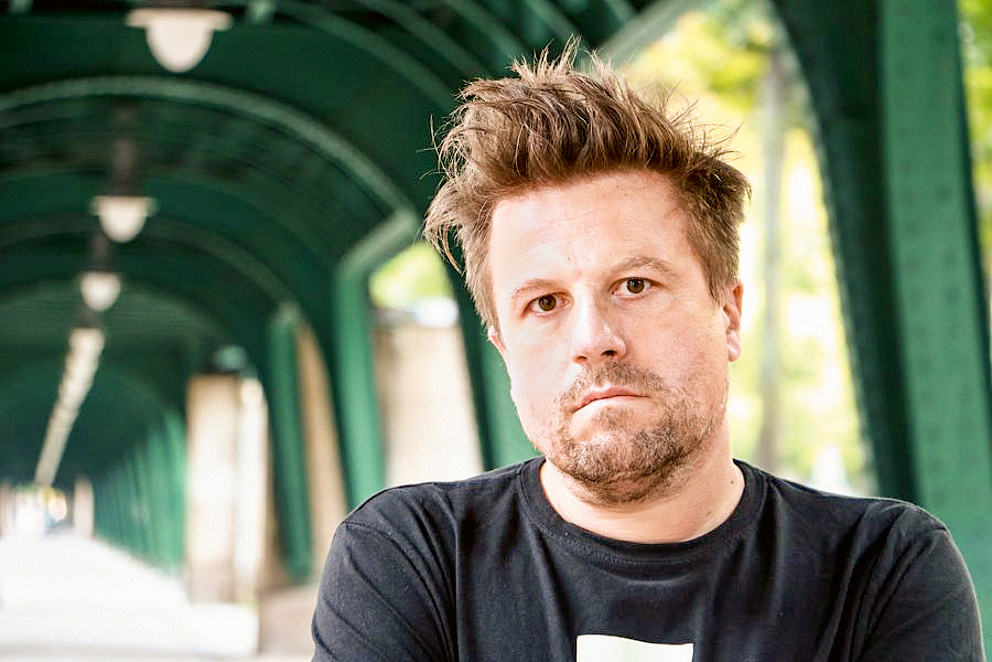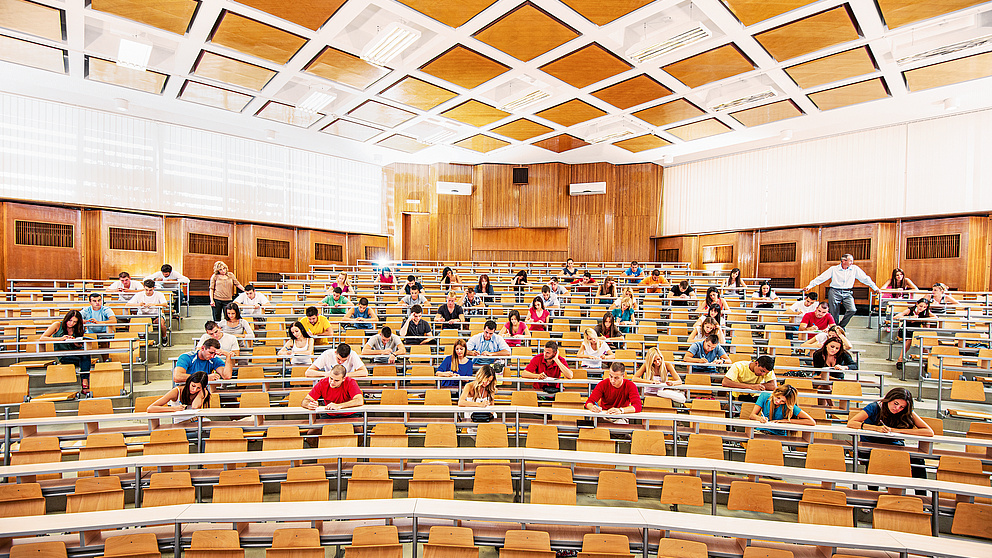Jump to the content
- {{#headlines}}
- {{title}} {{/headlines}}

Do join in!
We want to take this topic of diversity beyond the limits of the Humboldt Kosmos magazine. Let’s talk about it! We look forward to sharing your thoughts or your own experiences on #ProgressDiversity.
Sad but true: equality for everyone, that core element of any society that considers itself democratic, is just an empty promise. The continuously widening gap between poor and wealthy social classes paints a clear picture. This same gulf between aspirations and reality is particularly characteristic of the promise of equal opportunities held out by educational policy. In theory, educational institutions – from kindergarten to university – are supposed to help eliminate social differences. In truth, however, they tend to replicate them.
“Equality for everyone is just an empty promise.”
You can discover what form this takes in the case of my own country, Germany, in the recent edited volume “Vom Arbeiterkind zur Professur. Sozialer Aufstieg in der Wissenschaft” (From working-class child to professorship. Upward social mobility in academia). The book is an example of memoirs in which people report on their own advancement from a working-class or petit-bourgeois background to the exalted heights of an academic or artistic career, a subject that has recently enjoyed popularity on the book market, as evidenced by the works of French authors like Didier Eribon and Annie Ernaux. The sociological anthology “Vom Arbeiterkind zur Professur” combines scientific analysis with personal experience. Some 20 professors in both the sciences and humanities from Germany look back on their educational path. In some respects, I found the book an eye-opener. Given my background, it was hardly to be expected that I would ever pursue an academic career at a British university. My mother was a political refugee from Slovenia, my father came from a family of small farmers and labourers in rural Germany. Neither of them finished school with any qualifications; my father worked for years as a simple lathe operator in a fittings factory. There were barely any books in the house, but there was plenty of ambition for their son to do better – although they hardly envisaged a career as a scholar of literature.

DR UWE SCHÜTTE, born in West Germany in 1967, is a reader in German in the School of History, Languages and Translation at Aston University, United Kingdom. He studied modern German literature, English and history at LMU Munich and moved to the UK in 1992. He took his PhD at the University of East Anglia, Norwich, in 1997, supervised by the writer and literary scholar, W.G. Sebald. Uwe Schütte has been a Humboldt Research Fellow at Humboldt- Universität zu Berlin (2008 / 2009) and the University of Paderborn (2011). In 2017, he completed an external Habilitation at the University of Göttingen. His research focusses on contemporary German literature (especially W.G. Sebald) and popular culture / pop music (especially the band Kraftwerk).
The paranoia of being outed as an imposter

However different the individual stories of upward social mobility from lower social classes may be, you still encounter the same points time and again, namely, feelings and imprinting that Eribon and Ernaux also focus on in their memoirs: such as the feeling of having betrayed their social origins, paired with shame about being a social climber; then, having reached a top position in academia, bouts of paranoia about being exposed as an impostor. Moreover, professors from a working-class background share a basic consciousness – especially at informal meetings amongst colleagues – of not belonging. After all, as the French sociologist, Pierre Bourdieu, put it so succinctly: it is all a question of subtle differences.

But these subtle differences are not taught by the state education system, they are acquired through family background. In her polemic “Die Elenden” (The Wretched), the German journalist, Anna Mayr, who herself grew up as the child of long-term unemployed parents, pinpoints the difference: it lies in middle-class children’s innate certainty and almost inherent conviction that they are entitled to an elevated place on the career ladder and in society. So, it all boils down to a question of attitude to life, self-confidence. But this is precisely the confidence that gifted young people, who want to embark on an academic career, lack if they come from educationally disadvantaged families. It is partly responsible for them being filtered out at the decisive transitional points in the German educational system: Gymnasialempfehlung (recommendation for university- track schooling), Abitur (university entrance qualification), Bachelor’s degree, Master’s degree, research assistant jobs, doctorate, postdoc, Habilitation, appointment to a professorship – this is an almost insuperable obstacle course for a working-class child on the path to a professorship in Germany. But the crux is this: other people do not think they are up to it because they themselves do not believe it.
“The professors favoured the students with surnames that identified them as aristocratic.”
At university, everything suddenly changed
I recognised myself, in many ways, in the findings of “Vom Arbeiterkind zur Professur”. But not in all. Growing up in the 1970s and 1980s, the German school system did not put any obstacles in my way; not even when I was a day pupil at a prestigious Bavarian boarding school. As a student of German literature at LMU Munich, however, everything changed. In the overcrowded seminars it was immediately obvious which students knew how to conduct themselves in order to attract the professors’ attention.
The latter, in turn, made no secret of favouring the students with surnames that identified them as aristocratic or as relatives of well-known intellectuals. Agreements were quite openly made between tutors and students supported by the Studienstiftung (German Academic Scholarship Foundation) to secure their examination success. If you wanted to take a doctorate, you had to apply to a professor as a candidate. Some of my friends failed at that point. Put off by this, I did not even give it a try.
Instead, I organised my own year abroad in England which took me to the University of East Anglia where a German-born German scholar by the name of W.G. Sebald was teaching. His outstanding essays on Austrian literature ultimately convinced me to go to Norwich. After a year there, nothing could have enticed me back to Munich; I took my PhD with Sebald, who, with publication of the English translations of his collection of stories, “The Emigrants”, and his prose work, “The Rings of Saturn”, was just shooting to fame as arguably the most important German writer of the late 20th century. After graduating, I soon found a lectureship at Aston University in Birmingham where I have been teaching ever since.
So, the fact that my “emigration” to England, whilst not getting me, the working-class boy, a professorship, but clearly enabling me to realise my ambition of a university career, is my version of an upward mobility story. I therefore have a lot to be grateful to England for. Not just the opportunity to do a doctorate with the most unusual, impressive supervisor in every way imaginable who himself had seen just as few prospects of a university career in Germany at the beginning of the sixties. As opposed to the German university system, I could also spend time productively working on research without the existential worry of whether an underpaid, fixed-term, project-financed position would be extended, or uncertainty as to whether unpaid teaching duty as a Privatdozent (private lecturer) would ever earn me one of the rare professorships in German studies.
Therefore, I have the Humboldt Foundation to thank for repeatedly sponsoring me since 2008. I consider its meritocratic principle of basing funding decisions on academic excellence without regard to social background or gender to be eminently fair. Only an egalitarian approach of this kind can produce diversity in academia. Increased diversity is a moral necessity in response to the unequal social distribution of opportunity. Particularly in view of the challenges currently facing society, the issue of social justice is of the utmost importance.

